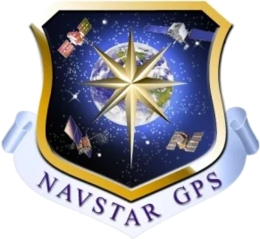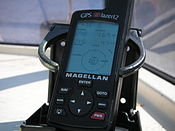
Back GPS Afrikaans Sistema de Posicionamiento Global AN نظام التموضع العالمي Arabic جی بی اس ARZ GPS AST GPS Azerbaijani قلوبال مؤقعیت تعیین ائتمه سیستمی AZB GPS Bashkir GPS BAR GPS Byelorussian
 GPS Logo | |
| Country/ies of origin | United States |
|---|---|
| Operator(s) | US Space Force (Mission Delta 31) |
| Type | Military, civilian |
| Status | Operational |
| Coverage | Global |
| Accuracy | 30–500 cm (0.98–16 ft) |
| Constellation size | |
| Nominal satellites | 24 |
| Current usable satellites | 31 operational |
| First launch | February 22, 1978 |
| Total launches | 79 |
| Orbital characteristics | |
| Regime(s) | 6 MEO planes |
| Orbital height | 20,180 km (12,540 mi) |
| Orbital period | 1⁄2 sd or 11 hours and 58 minutes |
| Revisit period | 1 sidereal day |
| Other details | |
| Cost |
|
| Website | gps.gov |
| Geodesy |
|---|
 |
The Global Positioning System (GPS), originally Navstar GPS,[2] is a satellite-based radio navigation system owned by the United States Space Force and operated by Mission Delta 31.[3][4] It is one of the global navigation satellite systems (GNSS) that provide geolocation and time information to a GPS receiver anywhere on or near the Earth where there is an unobstructed line of sight to four or more GPS satellites.[5] It does not require the user to transmit any data, and operates independently of any telephone or Internet reception, though these technologies can enhance the usefulness of the GPS positioning information.[6] It provides critical positioning capabilities to military, civil, and commercial users around the world. Although the United States government created, controls, and maintains the GPS system, it is freely accessible to anyone with a GPS receiver.[7]
- ^ a b "Fiscal Year 2023 Program Funding". April 27, 2022. Retrieved September 24, 2023.
- ^ United States Department of Transportation; Federal Aviation Administration (October 31, 2008). "Global Positioning System Wide Area Augmentation System (WAAS) Performance Standard" (PDF). p. B-3. Archived (PDF) from the original on April 27, 2017. Retrieved January 3, 2012.
- ^ United States Department of Defense (September 2008). "Global Positioning System Standard Positioning Service Performance Standard" (PDF) (4th ed.). Archived (PDF) from the original on April 27, 2017. Retrieved April 21, 2017.
- ^ "GPS - NASA". September 25, 2023. Retrieved January 5, 2025.
- ^ Science Reference Section (November 19, 2019). "What is a GPS? How does it work?". Everyday Mysteries. Library of Congress. Archived from the original on April 12, 2022. Retrieved April 12, 2022.
- ^ Raza, Khalid (October 16, 2020). Computational Intelligence Methods in COVID-19: Surveillance, Prevention, Prediction and Diagnosis. Springer Nature. p. 114. ISBN 978-981-15-8534-0.
- ^ National Coordination Office for Space-Based Positioning, Navigation, and Timing (February 22, 2021). "What is GPS?". Archived from the original on May 6, 2021. Retrieved May 5, 2021.



